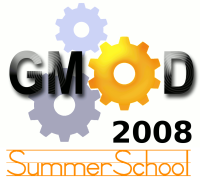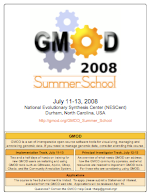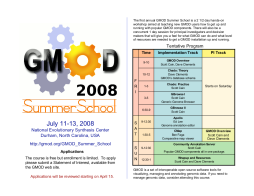GMOD
2008 GMOD Summer School

|
2008 GMOD Summer School July 11-13, 2008 National Evolutionary Synthesis Center (NESCent) Durham, North Carolina, USA |

|
|
The first annual GMOD Summer School was a 2 1/2 day hands-on workshop aimed at teaching new GMOD users how to get up and running with popular GMOD components such as Apollo, Chado, CMap, and GBrowse. Participants included 25 students and 4 instructors, from 19 states and 4 countries. It was held at the National Evolutionary Synthesis Center (NESCent) in Durham, North Carolina, USA, July 11-13, 2008.
Contents
- 1 Program
- 2 Who Attended?
- 3 Prerequisites
- 4 Cost and Registration
- 5 Transportation, Lodging, and Meals
- 6 Posters and Fliers
- 7 Acknowledgments and Feedback
Program
| The program featured two and half days of hands on training starting with an overview of GMOD and then covering installation and configuration of popular GMOD tools, include Chado, GBrowse, CMap, Apollo, and the Community Annotation System. | <img |
src=”https://raw.githubusercontent.com/GMOD/gmod.github.io/main/mediawiki/images/1/1d/SummerSchool2008GBrowse.jpg” width=”311” height=”120” alt=”SummerSchool2008GBrowse.jpg” /> |
| Time | Session |
|---|---|
| Friday July 11 | |
| 9am - 10:30am | GMOD
Overview Scott Cain and Dave Clements Participant and instructor introductions, how the GMOD project works, what software tools are available in GMOD, how they interoperate, what resources are needed to get a GMOD installation up and running, course overview, and installing VMware appliances on student computers. |
| 10:30am - Noon | Chado:
Theory Dave Clements Architecture and logical design of the Chado database schema: Chado's modules and extensibility, how IDs and database cross references are handled, the central role of ontologies/controlled vocabularies, and an overview of how sequence data is handled. |
| Noon - 1pm | Lunch
Break Places to eat NESCent is adjacent to Durham's 9th Street District. |
| 1pm - 3pm | Chado:
Practice Scott Cain Using Chado: Installation, importing and exporting data, and a complete worked example of loading example sequence data. |
| 3pm - 5pm | GBrowse 1 Scott Cain Overview, GBrowse installation and using GBrowse adaptors |
| 5pm - 6pm | Social
Hour Get to know your fellow GMOD Summer School participants, the instructors, and NESCent researchers. |
| 6pm - 7:30pm | Dinner
Break Places to eat |
| 7:30pm - 9:30pm | Open
Discussion Scott, Dave, Ben, Ed, and You! This optional session is open to any and all questions you have on the GMOD Project, GMOD components, and GMOD users. The instructors will come with their knowledge of GMOD and their opinions on the project's strengths, weaknesses, and future directions. We expect this to be lively. |
| Saturday July 12 | |
| 9am - 11:30pm | GBrowse 2 Scott Cain GBrowse Configuration: Changing defaults and displays, adding tracks, and performance tuning |
| 11:30pm - 12:30pm | Lunch
Break Places to eat |
| 12:30pm - 4pm | Apollo Ed Lee Overview, installation, configuration, reading/writing data, setting up a Java WebStart instance. |
| 4pm - 5pm | CMap 1 Ben Faga Overview, installation, configuration and data importation. |
| 5pm - 6:30pm | Dinner
Break Places to eat |
| 6:30pm - 9pm | CMap 2 Ben Faga Overview, installation, configuration and data importation. |
| Sunday July 13 | |
| 9am - 12:30pm | Community Annotation
System Scott Cain How to install and configure the GMOD Community Annotation System, an integrated package of GMOD components (including all the ones covered in this course) that reduces much of the installation, integration, and configuration work of doing each component individually. |
| 12:30 - 1pm | Wrapup
and Resources Scott Cain and Dave Clements Describe the resources available to GMOD users and attempt to bring the course to a coherent close. |
Instructors
Sessions were taught by experienced GMOD personnel, including:
- Scott Cain - GMOD Project Coordinator
- Dave Clements - GMOD Help Desk
- Ben Faga - CMap and GBrowse developer
- Ed Lee - Apollo developer
Who Attended?

The GMOD Summer School was attended by people implementing GMOD at their organizations, and by Principal Investigators whose organizations have adopted GMOD. The course went into detail about how to install and configure GMOD components. It was aimed primarily at GMOD System Administrators, the people who actually implement and manage a GMOD installation on a day to day basis. This course was for organizations either planning to use GMOD components, or in the early phases of implementing GMOD.
| Participant | Affiliation |
|---|---|
| Feseha Abebe-Akele | University of New Hampshire |
| Parker Antin | University of Arizona |
| Burcu Bakir-Gungor | Medical College of Wisconsin, RGD |
| Scott Cain | CSHL |
| Dave Clements | NESCent |
| Matthew Conte | Howard Hughes Medical Institute |
| Sean Davey | University of Arizona, BirdBase |
| Victor de Jager | Radboud University Nijmegen Medical Centre |
| Jason Dzurisin | University of Notre Dame |
| Ben Faga | CSHL |
| Bob Freeman | Harvard University Medical School |
| Jean-Pierre Gauthier | INRA |
| Glenn Harris | Virgina State University |
| Erik Hom | Harvard University |
| Zhiliang Hu | Iowa State University |
| Li Jin | University of Delaware |
| Ed Johnson | University of Georgia |
| Ed Lee | BBOP |
| Fabrice Legeai | INRA |
| Xianhua Liu | NESCent |
| Prashanti Manda | Mississippi State University |
| Tom McNeill | Syngenta Biotechnology |
| Christos Noutsos | University of Chicago |
| Jason Phillips | University of North Carolina |
| Joan Pontius | National Cancer Institute |
| Sarah Richardson | Johns Hopkins University |
| Stéphanie Sidibe-Bocs | CIRAD |
| Brett Whitty | Michigan State University |
| Andy Wu | Washington State University |
Prerequisites
The course requires a minimal level of Linux systems administration knowledge (see Computing Requirements). By “a minimal level of Linux systems administration knowledge” we mean that participants should be comfortable installing packages under Linux. A good benchmark for this level of knowledge is that you should be able to get a basic GBrowse installation (that is, GBrowse without MySQL) up and running with the example GBrowse data. This also requires installing Apache, and BioPerl and all its dependencies.
System Requirements
VMware on Windows and Linux
![]()
![]()
A free VMware player is available for Microsoft Windows and Linux operating systems from VMware. You will need to register to download it.
VMware on Mac OS X
Participants can also bring newer Macs with Intel processors. The Intel processor is a requirement for all the packages discussed below.
There is no free VMware player that runs directly under Mac OS X. However, there are several other options, all of which require an Intel Mac:
VMware Fusion
VMware Fusion allows you to run VMware images, Windows and Linux under Mac OS. We recommend this option for Mac users. There is a fully functional, 30 day free trial version of VMware Fusion available for download.
Mac OS 10.5 (Leopard) and Boot Camp
The Leopard release of Mac OS (10.5) includes Boot Camp, a feature that allows you to boot your Mac into another operating system, including Windows or Linux. From there you can install the VMware player for your OS.*
* Apple tells you that you can partition your disk drive at any time using Boot Camp. In practice, this appears to only work easily when you first get your system.
Cost and Registration
There was no tuition cost for the GMOD Summer School. Participants were responsible for their own travel, lodging and meal expenses.
The course was full with a waiting list. Due to last minute cancellations and the flexibility of applicants we were able to get everyone who applied into the course (and we still had a full course).
Transportation, Lodging, and Meals
Participants were responsible for their own transportation, lodging and meals. Everyone who flew, came in through Raleigh-Durham International Airport (RDU), a 30 minute drive from NESCent. Most participants stayed at Millennium Hotel Durham, which provided a free shuttle to and from NESCent.
NESCent is adjacent to Durham’s 9th Street District where participants ate most of their meals.
Posters and Fliers
Note: Both of these posters are now out of date. The PI Track has now been combined with the Implementation track, and the schedule details shown on the second one have now changed.
 Download A poster (US Letter size) announcing the 2008 GMOD Summer School. |
 Download A flier with the schedule on it also available. |
Acknowledgments and Feedback
The 2008 GMOD Summer School was funded by NIH grant 1R01HG004483-01 under Ian Holmes.
*Comments on the 2008 GMOD Summer School*
| “This was a very smooth course. All of the programs were focused, and well prepared. The instructions on the wiki were clear and the support from the instructors was very lively.” | “Great job everybody!” “Overall an exceptional experience!” |
| “Well
done!” “Great job all around.” |
“I was very impressed by everyone
involved in putting on the school. It was very apparent that they had
gone the extra mile and really cared about the quality of the
classes.” |
| “Thank you very much for this first GMOD Summer School.” | “The course was what I was expecting and more.” |